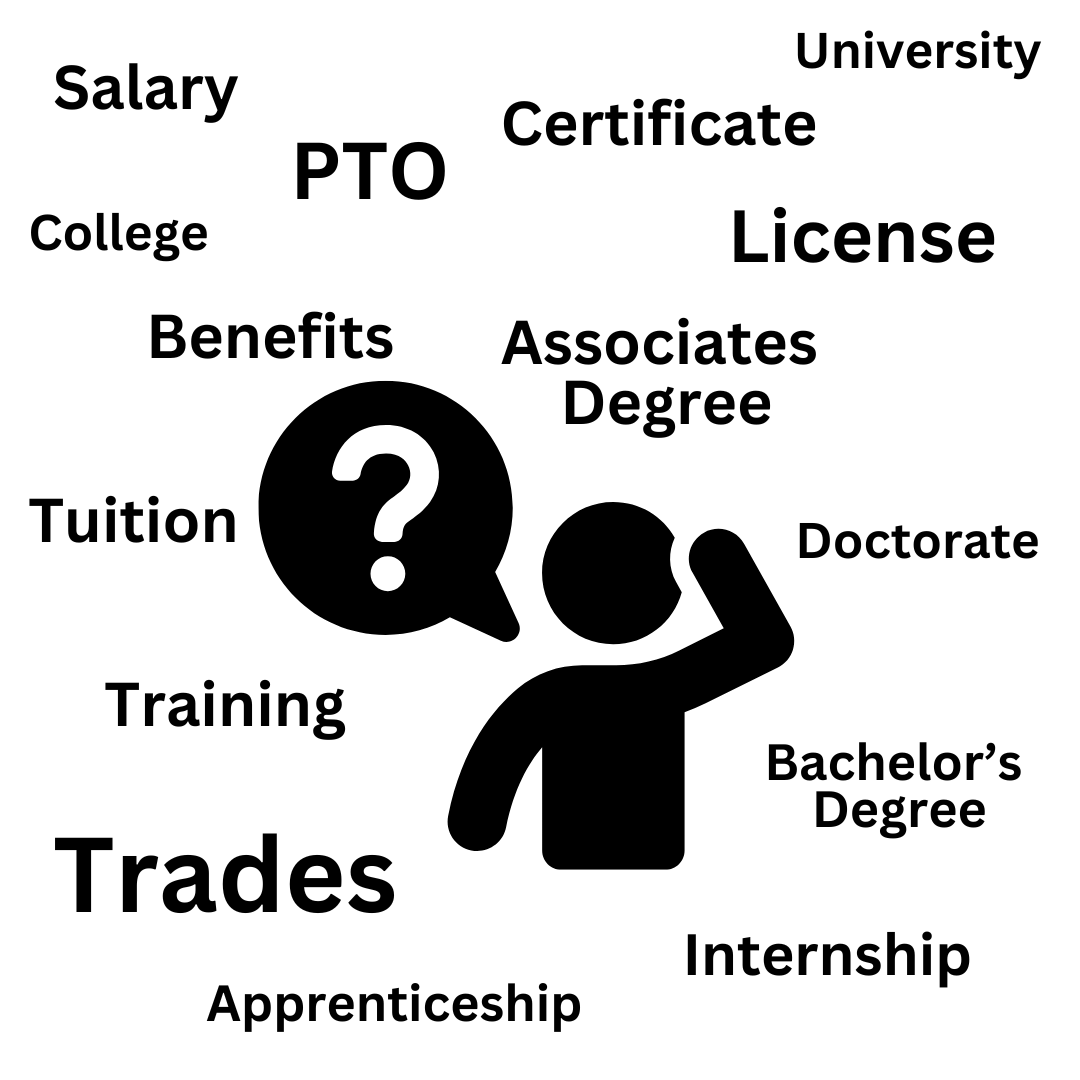Exploring careers by pathway, rather than focusing on specific careers, offers high school students a broader, more adaptable approach to planning their future. Career pathways group related occupations, allowing students to explore various roles within an industry without committing to a single career too early. This flexibility is valuable because it exposes students to a wide range of opportunities within a field, helping them identify their interests, strengths, and preferences over time. Additionally, by focusing on a pathway, students can develop a versatile skill set that applies to multiple careers within an industry, making them more adaptable to changes in the job market. It also reduces the pressure to choose a specific career prematurely, giving students the chance to explore and learn before making more focused decisions as they advance in their education or enter the workforce. This exploration helps students become more informed and prepared for a variety of roles, setting them up for long-term success and career satisfaction.
Agricultural Pathways
- Agribusiness Systems Pathway: The agribusiness systems career pathway focuses on the business side of agriculture, encompassing areas like farm management, marketing, finance, and supply chain operations related to food production and distribution. Students in this pathway develop skills in economics, management, and agricultural technology, preparing them for careers in agricultural business, sales, or farm management.
- Agriculture Education Pathway: The agriculture education systems career pathway prepares students to teach and promote agricultural practices and knowledge in educational settings, from high schools to community programs. Students in this pathway learn about agriculture science, teaching methods, and leadership skills, equipping them to inspire and educate the next generation of agricultural professionals.
- Agriculture Technology Pathway: The agriculture technology career pathway centers on integrating advanced technologies like automation, robotics, and data-driven tools to enhance farming processes and increase agricultural productivity. Students in this pathway develop skills in technology application, systems management, and agricultural innovation, preparing them for careers in precision agriculture, agri-tech development, and sustainable farming solutions.
- Animal Systems Pathway: The animal systems career pathway focuses on the care, management, and study of animals in fields like veterinary science, livestock production, and animal nutrition. Students in this pathway gain knowledge in animal biology, health, and welfare, preparing them for careers in veterinary medicine, animal husbandry, or animal research.
- Biotechnology Pathway: The biotechnology career pathway emphasizes the use of biological systems and organisms to develop products and technologies that improve health, agriculture, and the environment. Students in this pathway learn about genetics, microbiology, and bioengineering, preparing them for careers in research, pharmaceuticals, and agricultural biotechnology.
- Environmental Service Pathway: Careers in the environmental service pathway focus on protecting and improving the natural environment through fields such as conservation, pollution control, and sustainable resource management. Professionals in this pathway work as environmental scientists, conservationists, or environmental engineers, addressing issues like waste management, water quality, and ecosystem preservation.
- Food Systems Pathway: Careers in the food systems pathway involve the production, processing, distribution, and marketing of food, emphasizing sustainable practices and food safety. Professionals in this pathway can work in various roles, including food scientists, supply chain managers, and agricultural economists, addressing challenges related to food security, nutrition, and the efficiency of food systems.
- Natural Resources Pathway: Careers in the natural resources pathway focus on the management and conservation of natural environments and resources, such as forests, water, and wildlife. Professionals in this pathway can work as conservation biologists, forestry technicians, or natural resource managers, addressing issues related to sustainability, habitat preservation, and ecosystem health.
- Plant Systems Pathway: Careers in the plant systems pathway involve the study, cultivation, and management of plants for various purposes, including agriculture, horticulture, and landscaping. Professionals in this pathway can work as agronomists, horticulturists, or plant breeders, focusing on improving crop yields, developing pest-resistant varieties, and promoting sustainable agricultural practices.
- Power Systems Pathway: Careers in the power systems pathway focus on the generation, distribution, and management of energy and electrical systems, including renewable energy sources and traditional power generation. Professionals in this pathway can work as electrical engineers, energy analysts, or power plant operators, addressing challenges related to energy efficiency, grid management, and sustainable energy solutions.
- Skilled Trades Pathway: Careers in the skilled trades pathway encompass a variety of hands-on professions that require specialized training and expertise, including carpentry, plumbing, electrical work, and welding. Professionals in this pathway often enjoy high demand and job security, as they contribute essential skills to construction, manufacturing, and maintenance industries, while also having opportunities for self-employment and entrepreneurship.
- Sustainable Systems Pathway: Careers in the sustainable systems pathway focus on developing and implementing practices that promote environmental stewardship, resource conservation, and social responsibility across various industries. Professionals in this pathway can work as sustainability consultants, environmental planners, or renewable energy specialists, addressing challenges related to climate change, waste management, and sustainable development initiatives.
Education and Training
High school students should understand that post-high school education and training play a crucial role in shaping their future careers. There are multiple pathways, including four-year universities, community colleges, trade schools, apprenticeships, and specialized certification programs. Each option offers different opportunities depending on a student’s career interests and goals. It’s essential to research the educational requirements of desired careers, as some may require a college degree, while others may prioritize hands-on skills learned in vocational programs. Financial planning is equally important—students should explore scholarships, financial aid, and the cost differences between various educational institutions. Additionally, internships and part-time work during or after high school can provide valuable experience and insight into different professions. Developing soft skills like communication, teamwork, and time management is also critical for career success. Ultimately, students should view post-high school education as an investment in their future, not only academically but in terms of personal growth, skill-building, and career readiness.
Exploring Careers While in High School
High school students can prepare for careers they’ll enjoy and succeed in by exploring their interests, developing essential skills, and gaining hands-on experience. Self-assessment tools, such as personality tests and career interest surveys, can help them identify fields that align with their strengths and values. Researching careers, attending job fairs, and shadowing professionals provide real-world insights into various fields, helping students understand different job roles and what each entails. Extracurricular activities, part-time jobs, and internships allow students to test their interests while building transferable skills like communication, teamwork, and problem-solving. By taking career-oriented electives and meeting regularly with a guidance counselor, students can access tailored advice and educational resources to make informed choices. Remaining open-minded and flexible is key, as career interests often evolve through these experiences, guiding students toward fields where they’ll thrive.

